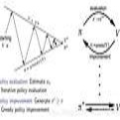Stochastic allocation of resources in the context of wireless systems ultimately demands reactive decision making for meaningfully optimizing network-wide random utilities, while respecting certain resource constraints. Standard ergodic-optimal policies are however susceptible to the statistical variability of fading, often leading to systems which are severely unreliable and spectrally wasteful. On the flip side, minimax/outage-optimal policies are too pessimistic and often hard to determine. We propose a new risk-aware formulation of the resource allocation problem for standard multi-user point-to-point power-constrained communication with no cross-interference, by employing the Conditional Value-at-Risk (CV@R) as a measure of fading risk. A remarkable feature of this approach is that it is a convex generalization of the ergodic setting while inducing robustness and reliability in a fully tunable way, thus bridging the gap between the (naive) ergodic and (conservative) minimax approaches. We provide a closed-form expression for the CV@R-optimal policy given primal/dual variables, extending the classical stochastic waterfilling policy. We then develop a primal-dual tail-waterfilling scheme to recursively learn a globally optimal risk-aware policy. The effectiveness of the approach is verified via detailed simulations.
翻译:随着无线系统中资源的随机分配最终需要针对网络级别的随机效用做出反应性的决策,同时尊重某些资源约束。然而,标准的遍历最优策略容易受到衰落的统计变异性影响,从而导致系统严重不可靠和频谱浪费。反之,最小化最大/失误率最优策略过于悲观,并且往往难以确定。我们针对无交叉干扰的标准多用户点对点功率受限通信提出了一种新的风险意识资源分配问题,通过使用条件风险价值(CV@R)作为衰落风险的衡量标准。这种方法的一个显着特点是它是遍历设置的凸泛化,同时以完全可调的方式引入了鲁棒性和可靠性,从而弥合了(天真的)遍历和(保守的)最小化最大方法之间的差距。我们提出了一个基于原始/对偶变量的CV@R最优策略的闭式表达式,扩展了经典的随机注水策略。然后,我们开发了一个原始-对偶尾水注水方案来递归地学习全局最优的风险意识策略。通过详细的模拟验证了该方法的有效性。

